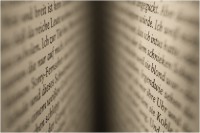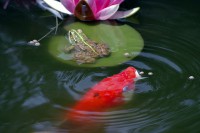Many a true word is…

Many a true word is spoken in jest. More »

Many a true word is spoken in jest. More »

嘘から出た実(まこと)。[嘘から出た真(まこと)。] – 『いろは歌留多(江戸)』(日本の諺) / 冗談で語られる中にも多くの真実がある。 More »

We know too much, and are convinced of too little. Our literature is a substitute for religion, and so is our religion. – T. S. [Thomas Stearns] Eliot (1888 – 1965) More »

我々の知るところは余りに多く、確信するところは余りに少ない。我等の文学は宗教の代用品、我等の宗教もまた然り。 – T・S・エリオット (1888 – 1965) More »
![IMAGE: O Romeo, Romeo! wherefore art thou Romeo? [Oh Romeo, Romeo! why are you Romeo?]](https://www.ok312.net/wp-content/uploads/2015/05/balcony-439286_640-200x145.jpg)
O Romeo, Romeo! wherefore art thou Romeo? [Oh Romeo, Romeo! why are you Romeo?] – Juliet — William Shakespeare (1564 – 1616): Romeo and Juliet, Act II, Scene II More »
![IMAGE: O Romeo, Romeo! wherefore art thou Romeo? [Oh Romeo, Romeo! why are you Romeo?]](https://www.ok312.net/wp-content/uploads/2015/05/balcony-439286_640-200x145.jpg)
ああ、ロミオ、ロミオ! あなたはどうしてロミオなの? – ジュリエット — ウィリアム・シェイクスピア (1564 – 1616): 『ロミオとジュリエット』第二幕第二場 More »

Great pains but all in vain. / You fish fair and catch a frog. / (To catch the wind…) More »

骨折り損の草臥れ儲け(くたびれもうけ)。 – 『いろは歌留多(江戸)』 / ずいぶん釣りをして蛙一匹。 / (日本の諺)労多くして功少なし。 / (中国~日本の諺)労して功なし。 – 荘子[荘周] (紀元前369頃? – 前286頃?): 「天運」 / (無駄骨…) More »
![IMAGE: Love your neighbor (as yourself). [You shall love your neighbour as yourself.]](https://www.ok312.net/wp-content/uploads/2015/03/woman-286469_640-200x133.jpg)
Love your neighbor (as yourself). [You shall love your neighbour as yourself.] – Jesus (c.4B.C.? – c.30?) — Bible: “The Gospel According to Matthew” Chapter 22:39 More »
![IMAGE: Love your neighbor (as yourself). [You shall love your neighbour as yourself.]](https://www.ok312.net/wp-content/uploads/2015/03/woman-286469_640-200x133.jpg)
(自分を愛するように)隣人を愛せ。 – イエス (紀元前4頃? – 30頃?) — 聖書: 『マタイによる福音書』第22章39節 More »